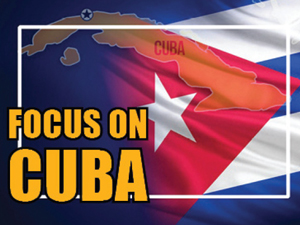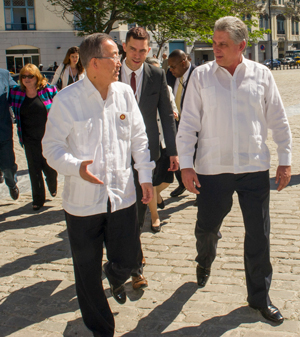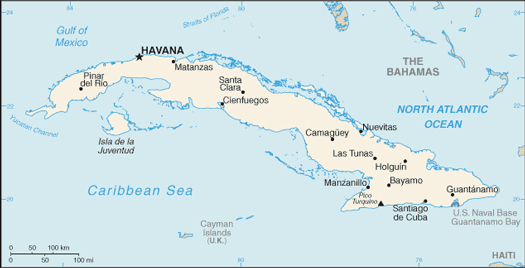Cuba’s new president faces challenges, changes in island nation
By Brian E. Muhammad -Staff Writer- | Last updated: May 2, 2018 - 10:13:52 AMWhat's your opinion on this article?
‘No one will weaken the revolution’

|
The Republic of Cuba has installed a new president and questions loom what the change indicates for the future of the island nation. The Cuban National Assembly formally elected the country’s 57-year-old vice president Miguel Diaz-Canel as the country’s new president April 19.
President Raul Castro, 86, remains as head of the ruling Communist Party until 2021. Observers say the change was an expected transition in the long saga of the nation.
“Cuba has been under sort of a period of transition for a while,” said Bill Fletcher Jr., a past president of TransAfrica Forum.
“It’s very important for people to be cautious in their judgments, because you have to see over the next 10 to 12 months the general direction of the country,” he advised.
Reports indicate the younger statesman is a “consensus builder” and people aren’t expecting any “monumental changes” from President Diaz-Canel.
“He made it crystal clear that the revolution will stay its course,” said Gerald Pereira, chairperson of the Black Consciousness Movement-Guyana and Organization for the Victory of the People. “The principles that guide the revolution will not be compromised. It’s not up for negotiation and there will be no restoration of capitalism,” he added.

Former U.N. Secretary-General Ban Ki-moon (left) meets with Miguel Díaz-Canel (right), First Vice-President of the Council of State and the Council of Ministers of Cuba on Jan. 27, 2014. Photo: UN Photo/Mark Garten
|
But, Cuba is evolving, and internal economic dynamics are driving self-evaluation and changes in the country.
“The mandate given by the people to this house is to give continuity to the Cuban revolution in a crucial historic moment,” Pres. Diaz-Canel remarked, during his first speech as president before the National Assembly.
Mr. Pereira, in a Final Call telephone interview from Guyana, said although Pres. Diaz-Canel committed to continue the vision of his predecessors, there are some changes underway that Cuba had to consider.
“The problem with orthodox Marxist theory is that there is this tendency to equate ‘ownership’ (of) private property with capitalism,” he observed. “The state cannot own everything,” explained Mr. Pereira. “Strategic resources should be in the hand of the state sector.”
This way, the government maintains control of key industries like education, health care, and natural resources. It’s the financial resources made from strategic sectors that will allow Cuba to raise the standard of living and quality of life of the Cuban people.
Cuba is expanding the scope of the capitalist market economy and at the same time there is a struggle concerning the increase of workers cooperatives in the country, Mr. Fletcher said.

|
Pres. Raúl Castro gradually began liberalizing Cuba’s socialist economy allowing small, private enterprises to operate and converting some state enterprises into cooperatives owned and operated by workers.
The cooperatives are seen by some as a way of opening the country up to capitalism and privatization while maintaining some of the revolution’s collectivist ideals.
According to an Al Jazeera report, Pres. Diaz-Canel is not known to support changing Cuba’s government from the one-party system in place since the revolution, a demand from anti-Castro politicians in the U.S.
Observers note Cuba didn’t start out communist. In the aftermath of the resistance against the American backed regime of dictator Fulgencio Batista, U.S. Cuba policy shifted to antagonist. Fidel Castro then formed an alliance with the Soviet Union as a counter weight to U.S. threats.
The U.S. placed an economic embargo to foster domestic hardship aimed at destroying popular support for the revolution. But, despite the strain, Cuba still supported oppressed peoples causes worldwide. Analysts say the move indicates an expected generational change in leadership that Cuba has been hinting for several years.
“We’re almost in the future that we’ve been talking about, a transition,” said Jose Ramon Machado Ventura, the 87-year-old second vice president who also fought alongside the Castro brothers in the revolution.
Associated Press quoted Mr. Machado-Ventura as saying: “We’ve been in transition since Jan. 1, 1959. Now, the change is generational.”
President Raul Castro came to power after his older brother Fidel stepped down for health reasons in 2008. The Castros are part of a seasoned old guard leadership who led the country since the Cuban Revolution in the 1950s. The revolution ushered in an era guided by the hand of Comandante Fidel Castro until his death at 90 years old, November 25, 2016.
Mr. Fletcher said he believes if the Soviet Union hadn’t collapsed, Fidel Castro probably would have stepped down sooner. But the extraordinary situation that they found themselves in led Fidel to stay on. For his part, Raul Castro correctly decided to “not make it a lifetime appointment” and be “a transitional figure,” said Mr. Fletcher.
During his final year in office, U.S. President Barack Obama made an historic trip to Cuba leading a large government and trade delegation. He was the first U.S. head of state to visit Cuba since an official trip by President Calvin Coolidge in 1928.
Under the Obama administration U.S.-Cuba relations were softened to a degree. A travel ban was lifted, and a 55-year embargo was relaxed clearing the way for new economic opportunity.
However, with the election of Pres. Donald Trump, Washington has moved to reverse the gains on Cuba from the Obama administration. Cuba’s presidential change comes at a time it faces new U.S. volatility from President Trump and his ultra-hawkish national security chief John Bolton, observers say.
“This means a very unpredictable situation that could be one of renewed U.S. destabilization efforts,” Mr. Fletcher said.
The Trump administration’s posture has been particularly menacing toward countries like Cuba, Venezuela, North Korea and Iran.
“It’s not clear what direction the Trump administration is going to take, and whether they will give the new president of Cuba any breathing room, or whether they are going to meet him with renewed hostility,” Mr. Fletcher noted.
Documented history shows over 600 attempted assassinations of Fidel Castro organized by the U.S. Central Intelligence Agency. Every U.S. administration from Dwight Eisenhower to the present were in some way connected to or responded to Cuban reactionaries who plotted against Cuba.
Cuba’s historic adversaries will continue to look for the potential crack in the veneer of the Cuban government. However, continuity and legacy are paramount, said the new president.
“Cuban foreign policy will remain unchanged and we reiterate that no one will be able to weaken the Revolution, nor make the Cuban people yield because Cuba does not make concessions against its sovereignty and independence,” said President Diaz-Canel.
INSIDE STORIES AND REVIEWS
-
-
About Harriett ... and the Negro Hollywood Road Show
By Rabiah Muhammad, Guest Columnist » Full Story -
Skepticism greets Jay-Z, NFL talk of inspiring change
By Bryan 18X Crawford and Richard B. Muhammad The Final Call Newspaper @TheFinalCall » Full Story -
The painful problem of Black girls and suicide
By Charlene Muhammad -National Correspondent- » Full Story -
Exploitation of Innocence - Report: Perceptions, policies hurting Black girls
By Charlene Muhammad -National Correspondent- » Full Story -
Big Ballin: Big ideas fuel a father’s Big Baller Brand and brash business sense
By Bryan Crawford -Contributing Writer- » Full Story






 Click Here Stay Connected!
Click Here Stay Connected!








